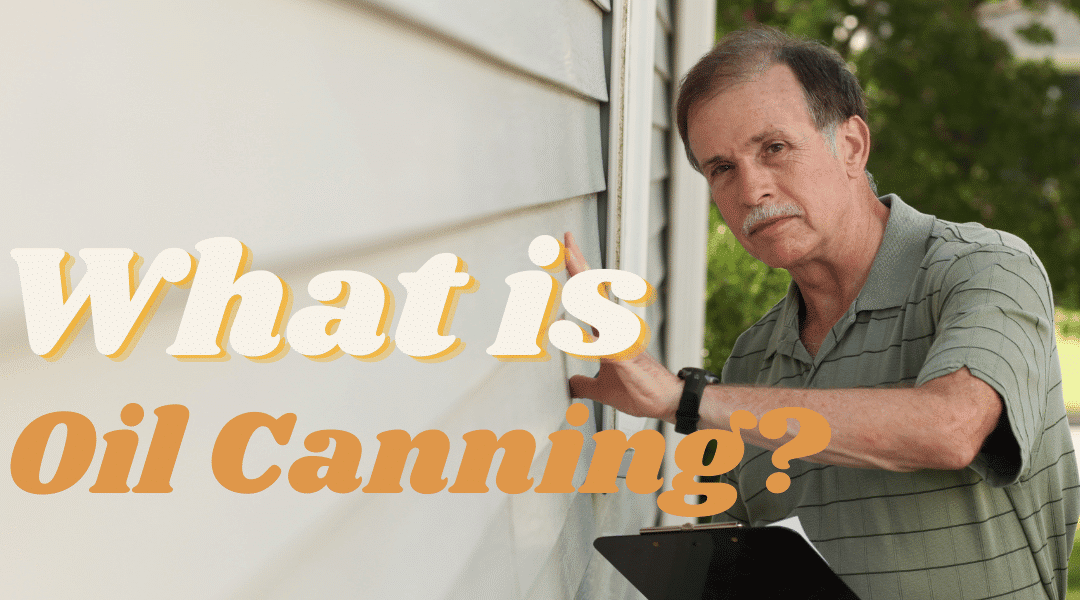Vinyl siding is a popular choice among homeowners for its durability, low maintenance, and aesthetic appeal. However, vinyl siding may rarely develop issues such as “oil canning” or warping. In this article, we’ll explore what oil canning is, what causes it, and how homeowners can address and prevent this relatively uncommon concern.
What is Oil Canning?
Oil canning, sometimes referred to as “waviness” or “rippling,” is a phenomenon in which the surface of vinyl siding appears to bulge or warp, resembling the bottom of an oil can. It’s a visual distortion that can detract from the overall appearance of your home’s exterior. Fortunately, it’s not a structural issue and can be addressed without compromising the integrity of your siding.
What Causes Oil Canning?
Several factors can contribute to the development of oil canning in vinyl siding:
- Incorrect Installation: Improper installation, such as securing the siding too tightly or using the wrong fasteners, can lead to oil canning.
- Substrate Issues: If the underlying substrate (the surface beneath the siding) is not properly prepared or is uneven, it can result in oil canning.
- Low-Quality Siding: Vinyl siding comes in varying levels of quality. Low-quality siding is more susceptible to oil canning due to manufacturer defects.
- Panel Length: Longer siding panels are more prone to oil canning due to their increased surface area.
How to Address Oil Canning
If you notice oil canning on your vinyl siding, it’s possible to address it promptly to restore your home’s curb appeal. Here are some steps to consider:
- Contact a Professional: Reach out to a licensed siding contractor with experience in vinyl siding repairs. They can assess the issue and recommend appropriate solutions. If your siding was installed by Superior Siding and Window Systems, get in touch with us for a repair.
- Adjust Installation: If the oil canning is due to incorrect installation, the contractor may need to adjust the siding’s attachment to alleviate the stress on the panels.
- Panel Replacement: In some cases, severely warped panels may need to be replaced. This should be done by a professional to maintain the overall appearance and integrity of your siding.
- Preventative Measures: To prevent future oil canning, choose high-quality vinyl siding, and hire experienced professionals for installation. Additionally, select siding with a shorter panel length if possible.
If Superior Siding and Window Systems Installed your Vinyl Siding
We are VSI Certified, which means we have passed rigorous requirements from the Vinyl Siding Institute. The Vinyl Siding Institute offers a certification program that covers the proper installation techniques and best practices for vinyl siding. This certification demonstrates a commitment to quality installation and adherence to industry standards. Rest assured the odds are in your favor when you work with Superior Siding and Window Systems.
However, in the rare event a manufacturer defect or conditions on site resulted in a ripple on your vinyl siding, you have our commitment that we will do everything in our power to make it right. We stand by our products, our people and our work.
The last word
While oil canning in vinyl siding is uncommon, it can be a concern for homeowners. However, with proper installation and the assistance of experienced siding professionals, this issue is rare and entirely addressable. Remember that vinyl siding remains an excellent choice for your home’s exterior, providing long-lasting durability and curb appeal when properly cared for. If you encounter oil canning, don’t hesitate to reach out to a trusted siding contractor to resolve the issue and keep your home looking its best.

